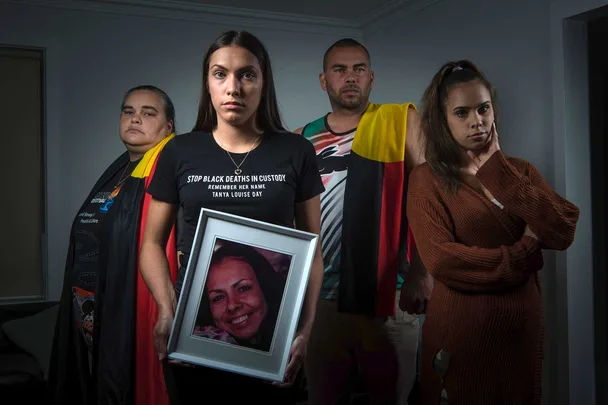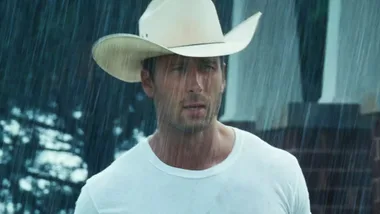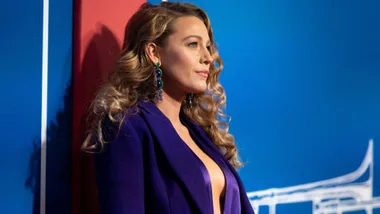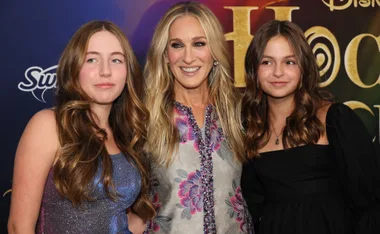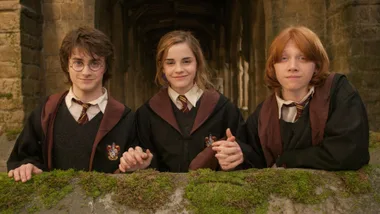Aboriginal and Torres Strait Islander peoples should be aware that this story contains images of people who have died.
After Yorta Yorta woman Aunty Tanya Day died in December 2017, her children began looking for traces of her memory in her bedroom. They already had much of it close to their hearts.
Their mother, 55, was a proud community woman. She had helped run the co-op in her home town of Echuca and had assisted at the childcare centre. She was an excellent cook and used her skills to make big batches of food for elders and the community, as well as bake cupcakes with her grandchildren.
She was also political and had travelled interstate to attend rallies against black deaths in custody, standing in solidarity with families of victims. Her advocacy had taken shape early in her life, after her uncle Harrison Day died in custody when she was a teenager. His death was one of 99 investigated by the landmark Royal Commission into Aboriginal Deaths in Custody (RCIADIC, 1987–1991).
But along with the memories of their mother, in that bedroom they found her hopes for the future. On a piece of paper, Aunty Day had written down her goals and dreams.
“Some of her goals were to get her [driver’s] licence and to get her own place,” her daughter Apryl, 28, tells marie claire. Aunty Day had been planning a move to Melbourne to get her qualifications in cooking, hoped to work at social enterprise restaurant Charcoal Lane, and to be closer to her daughter Kimberly, 23, who was pregnant.
“She was very much looking forward to her future,” her third daughter, Belinda, 39, says.

It’s a picture far removed from typical media portrayals of women such as Aunty Day.
On December 5, 2017, she had arrived at Echuca railway station in northern Victoria and bought a ticket to Melbourne – the site of her future dreams. But she would never reach her destination. Aunty Day, who had been drinking, fell asleep and just near Bendigo, she came to the attention of a V/Line train conductor. He claimed she was “unruly” and that her feet were blocking the aisles, and he called the police, who subsequently arrested her for public intoxication – an outdated law that the RCIADIC had recommended be abolished across the country nearly 30 years prior.
In the cell in Castlemaine police station, she suffered a fall, captured on CCTV footage. The police had failed to conduct regular checks. By the time she reached hospital, it was too late. Aunty Day died of brain injuries at St Vincent’s Hospital in Melbourne 17 days later.
The heartbreaking reality is that this woman should have never been in custody in the first place. Cross-examination by the coroner revealed she was not aggressive or disruptive, and the conductor admitted that he saw sleeping passengers on the train about three times a week, but this was the first time he’d ever called the police.
“She should have been left alone,” Belinda says. “She wasn’t unruly. She wasn’t disturbing anybody.” “She was asleep,” Apryl adds.
“There was systemic racism that played a part in decision-making [that day] and in the way the police are programmed and deal with Aboriginal people. Because at
the time, Aboriginal women were 10 times more likely to be arrested under [public drunkenness] laws than non-Aboriginal women.”
In May this year the world erupted in fury after African-American man George Floyd was killed by a police officer. His death, and his last words, “I can’t breathe,” were captured on mobile phone footage by bystanders, and streamed around the world.
In Australia, Aboriginal people were quick to point out that the deaths of black people in police watch houses and prison cells was not just an American phenomenon.
It was happening and had happened in our country too. In the 30 years since the RCIADIC, there have been 437 Aboriginal deaths behind bars. Shockingly, there’s been no convictions and very few charges laid.
Aboriginal people have not been silent about this reality, and protests have taken place every year as the death toll rises. In June, tens of thousands of people (including non-Indigenous allies) took to the streets of Australia to march for justice. Much of the spotlight was on the tragic death of Aboriginal man David Dungay Jr, who died in Sydney’s Long Bay jail after being held down by prison guards and injected with a sedative. His last words, like George Floyd’s, had echoed across the country: “I can’t breathe.”
But what’s received less attention is the deaths of Indigenous women behind bars. Since the RCIADIC, Aboriginal women – mothers, grandmothers, daughters and sisters – have been locked up at ever increasing rates, which far exceed the rates of other groups in society. Aboriginal women now make up 34 per cent of the female prison population (while accounting for just two per cent of the overall Australian female population). According to The Guardian newspaper’s Deaths Inside database, 22 First Nations women have died in custody since 2008.
“The figures are skyrocketing,” Melbourne University law researcher and Yuin woman Amanda Porter tells marie claire. “And the underlying issue has to do with policing. Every single death in custody points to that – [these women] are locked up for sleeping while black or locked up for drinking while black. They are locked up for being poor, for being unable to pay fines. And then there is even more blatant racial targeting like in Ms Wynne’s case, where it was a wrongful arrest and a wrongful raid.”
Ms Wynne was only 26 when she died in a Perth suburb in 2019. “Earlier in the morning she had gone to her mother’s house and the police had followed her there,” her grandmother Jennifer Clayton tells marie claire. “And they had slammed her to the ground and put handcuffs on her. And then they decided to ask who she was. It was a mistaken identity, they were looking for another girl. That would have been traumatic for anyone.”
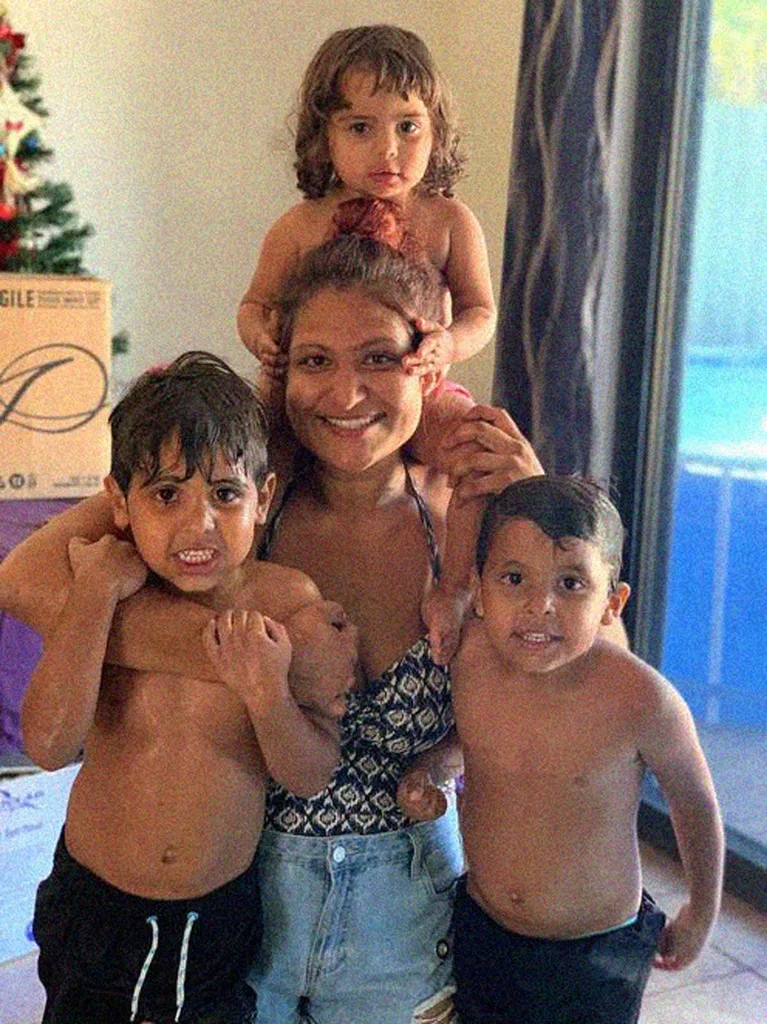
But it was particularly traumatic for Ms Wynne – a mother of three – who had had her baby daughter taken from her by child protection authorities at the hospital a week prior. Ms Wynne had turned up there to make sure her child hadn’t swallowed any pills after finding an empty packet on the floor.
The woman came from a history of trauma. Her father, Warren Cooper, died in custody in Albany when she was six years old. He was also 26.
After the wrongful arrest, Ms Clayton says Ms Wynne left the house and came back into contact with police and paramedics on a street nearby, where they put her in handcuffs. While handcuffed, she lost consciousness. She died in hospital four to five days later, after her family made the gut-wrenching decision to turn off her life support.
Today they are left waiting for answers and there is still no indication of when a coronial inquest will be held. This is one of the most traumatic aspects of losing a loved one in custody. In the period before an inquest or autopsy results are released, families are left wondering, not only “How did they die?” but also, “Why were they in custody in the first place?”
Ms Clayton says Ms Wynne would have been distrustful of police after growing up with the knowledge of what happened to her father: “She probably panicked and thought they [were] going to kill her, too.”
Now, Ms Wynne’s children have been robbed of a mother who loved them. “We’re left to pick up the pieces,” Ms Clayton says. “It’s racism. Our lives don’t mean anything. But they are forgetting these people are fathers, mothers, uncles, brothers, cousins. My granddaughter adored her kids and she was a good mother. She lived for them. She provided the best she possibly could for her children before she passed away.”
Just like Aunty Day, Ms Wynne had done nothing wrong on the day of her arrest. “This highlights the violence of policing,” Ms Porter says. “If you look at the facts of these cases about Aboriginal women, the thing that is striking, which they all have in common, is how criminality and offending have nothing to do with it.”
There are also parallels with the case of 22-year-old Yamatji woman Ms Dhu, who was held in custody for three days in a South Hedland, Western Australia, watch house in 2014. A victim of family violence, Ms Dhu had come to the attention of police and been incarcerated because she owed more than $3000 in unpaid fines. She was incarcerated for being poor.
During those three days, Ms Dhu slowly lost her life to septicaemia as an infection stemming from a broken rib – sustained during a family violence incident – spread through her body. During that time, she was in horrendous pain, but was repeatedly ignored and labelled a “junkie” and accused of faking it by both health professionals and the police.
Ms Dhu’s grandmother, Aunty Carol Roe, rang the police station multiple times to get updates about her granddaughter, who she remembers as “happy go lucky” and outgoing.
“They kept saying, ‘She’s fine, everything’s fine.’ But it wasn’t. When she was in custody they wouldn’t let me speak to her. But I knew there was something wrong,” Ms Roe says.
Ms Dhu’s death led to attention on Western Australia’s practice of locking up people to pay off unpaid fines, a law that had disproportionately targeted Aboriginal women. Earlier this year, the WA Parliament passed legislation making incarceration a “last resort” for fine defaults.
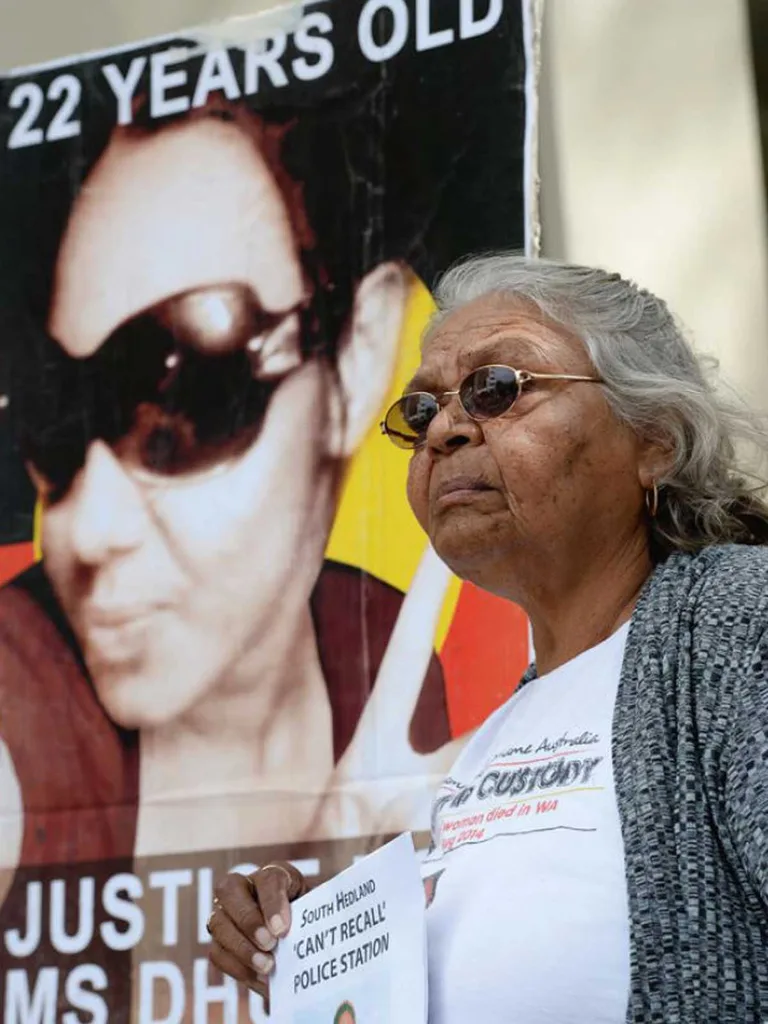
Ms Roe says although this news was welcomed, there’s still no justice for her granddaughter. She mourns for her every day – as do the rest of her family. Although Ms Dhu was not a mother, she was in the Aboriginal sense. Her sister’s children even called her “Mum”. But Ms Dhu never got the chance to have her own children. And Ms Roe says that no legislation change could make up for what they have lost.
The tragic and often unspoken reality is that Aboriginal deaths in custody are now an intergenerational issue. Ms Wynne and Ms Dhu were cousins, so Ms Clayton lost two granddaughters. It’s similar for the Day family: not only did Apryl and Belinda lose their mother, but three other relatives who have also died in custody.
Since that fateful day in 2017, the Day family has been fighting for justice. In June 2019 they were successful in getting “systemic racism” included in the terms of reference for the coronial inquiry into their mum’s death – the first time it had ever been included in a case surrounding an Aboriginal death in custody. They had another victory in August last year with the news that the Victorian Government planned to abolish the offence of public drunkenness.
Then, in April this year, the findings of the coronial inquest into Aunty Day’s death were delivered via video link amid COVID-19 lockdowns. The coroner found that unconscious bias influenced the treatment of Aunty Day on the train, and that decisions were “influenced by her Aboriginality”. And, in a landmark ruling, the coroner referred the case to the department of public prosecutions to determine if criminal negligence occurred.
Now her children are waiting to see whether the DPP will pursue charges. “Our fight doesn’t end after the inquest,” Apryl affirms.
In America, the protests that erupted around George Floyd’s death have led to critical conversations about the role of police. In June, the Minneapolis City Council announced it would be defunding the city’s police. It’s a conversation Apryl says must continue here. “I was waiting for the day where we actually start talking about defunding the police. These conversations are not new … but up until this point it has taken place at the margins. With the media spotlight from America, I would love to see us also having a conversation about defunding police and divestment.”
Ms Porter suggests we look at strategies around defunding the police – that is, reallocating funds to non-policing forms of public safety – and discuss the role of the powerful police unions, and the fact “police investigate police” in these cases.
For Aunty Day’s children, although nothing will bring back their mum, the first step towards justice is accountability in the form of convictions.
“This is urgent,” Belinda says, “and unfortunately we are not the only family who has gone through this. It’s distressing to know that there have been so many before us, who have fought to make these changes. Mum was very opinionated and very outspoken, and I think we take that from her.
“If she were here today she would have said, ‘Enough is enough. We’re not going to put up with it.’”
Stand Up For Justice
Aboriginal Lives Matter. Here are three campaigns and causes to support:
Justice For Tanya Day at gofundme.com
ANTaR a not-for-profit that fights for Indigenous rights at antar.org.au
Sisters Inside which advocates for women and girls in Australian prisons at sistersinside.com.au
This article originally appeared in the September 2020 issue of marie claire.
